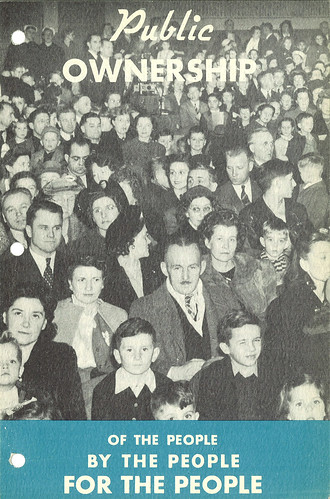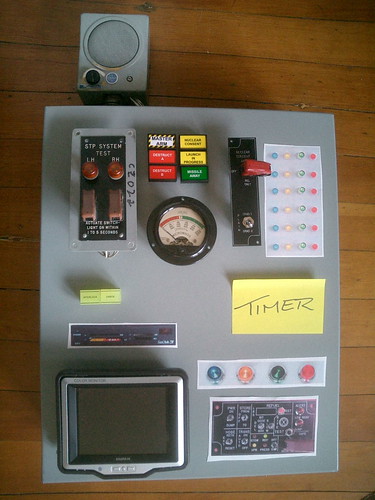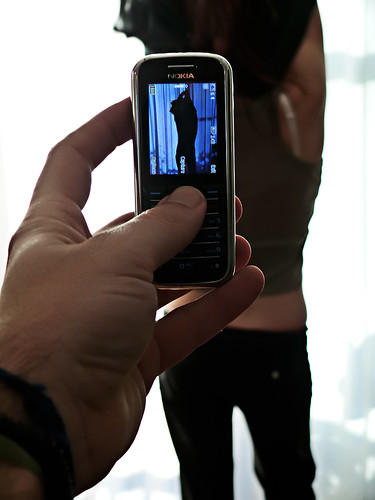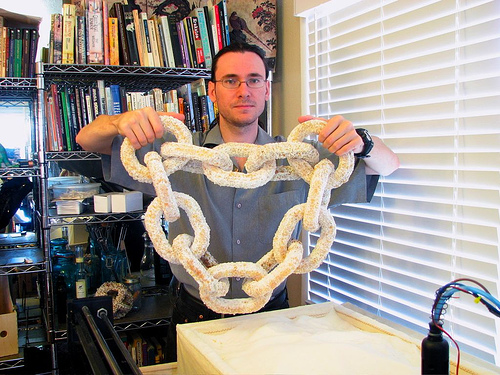This is a post to give recognition to individuals who have contributed, in my eyes, an excellent step forward in our online world. It is with regards to the DataPortability governance task force, who have developed a governance model for the DataPortability Project. Six individuals contributed hours upon hours (I lost count after 30 on my own contribution as chair!) but before I profile these individuals, some context.
History of the DataPortability Project
The DataPortability Project was originally a workgroup. Chris Saad and Ashley Angell, with guys in the Faraday Media team like Paul Jones and Stephen Kelly, shared an idea with Daniela Barbosa, Ben Metcalfe, Marjoelin Hoekstra and myself. The concept of promoting open standards, whilst allowing people to own their personal data, to enable interoperability. After discussing it privately, we created a workgroup and invited some brilliant minds in the industry to explore this concept. Several ideas were explored, with the most prominent being a Web Relational File System. A bit like the entire world wide web being like your desktop computer, where you could control your data like you can with files at the drag of a button ie, you could copy your Facebook photos into your Flickr account.

Discussions on the workgroup were diverse, and often, on completely different themes – something that frustrated people. However within two short months, news broke out – and the existence of the workgroup dominated the news of the tech industry. A public list created for people not on the workgroup skyrocketed in subscribers (currently around 1240 people). A simple idea that we were still exploring what it meant, was now being flagged as one of the key trends for 2008.
Things literally exploded overnight – and we now had this massive, vocal, enthuasiastic community. So over the course of January 2008, the closed workgroup was deprecated in favour for specific “action groups”. Learning from our experience in the workgroup that different people had different interests (ie, the developers and the marketer’s had different areas of interest, which frustrated each other), separate groups were created. One group focused on evangelism of what we did; another on the policy aspects that is one big chunk of the problem. A third on the technical blueprints of putting together these different open standards into a cohesive whole. A fourth on supporting people who are trying to implement DataPortability; and finally a fifth called the “steering group” which would host representatives from companies, representatives from the other action groups, and from a big picture point of view determine the strategy of the Project.
A unique thing about this community however, was that few people actually knew each other. There were (and still are) people from San Francisco, Boston, Los Angeles, Washington DC, Washington State, Florida…and that’s just some of the places in the US! People in Dublin (Ireland), London & Bristol (UK), Den Haag (The Netherlands), Hong Kong (China), Adelaide, Sydney & Brisbane (Australia) as well as several cities in Germany being ones I can think of off the top of my head. All these people, communicating daily – would do so via e-mail and teleconferences. I often would joke that the sun would never set on the DataPortability Project, as you would have different “tribes” waking up throughout the day. I would wake up and find an avalanche of messages awaiting for me catch up on.
Something else was more remarkable however, if I may say so myself. As co-founders of the Project, we thought this was an amazing opportunity to explore a concept of a non-hierarchical, de-centralised decision making group. A global community where everyone is equal, working towards this goal that if successful, could fundamentally change the Internet and consequently the economy.
Needless to say, it failed. Not in in the “it’s all over” sense, but it was “blood frustrating”. How can you make even basic decisions, when there is a six hour time lag with the group of people you are collaborating with? What happens when there is a disagreement – who has the final say? There was also a clash of cultures, between the entrepreneurial types and those who work as contractors, who have a “let’s just do it” attitude which was at odds with the people with organisational experience that operate when there is “process”. The former is used to getting things done on the fly without having to consult people; but as the latter group would argue, things don’t work like that with a group of people. Without a formal process of how things work, the boat so to speak, will sink.

As were were realising these issues however, we also were given a remarkable opportunity: the kind folk at TechCrunch donated $6,625 to us . We also privately had other companies and people asking how could they contribute. But how are you meant to donate money to an online community? To do that, you need a bank account – but who controls the bank account? The right answer is a legal entity. But how can you create a legal entity, when you don’t have a formal decision making body?
And so the governance task force was created.
Starting in April under the approval of the Steering Action Group, the mandate was for the task force to:
1) Propose a lifecyle of an idea with it’s involvement with DataPortability, and ultimately it’s implementation.
2) Propose a working decision making framework to be used within the DataPortability Project.
This goal encapsulated the frustration we as a community has experienced of not effectively being able to get things done; as well as a formal process of how decisions were made. Relatively simple things, but criticial DNA for any organisation that when you get into the details, is actually a difficult subject. And although Robert’s Rules of Order are a standard in the world for protocol, this is by no means easily applied to the online world and is subject to academic research .
So we did a few conference calls (some documented here ; others not documented – with a period where we did daily ones for a week); we discussed via e-mail quite a bit; as well as a chat room (which is now closed off). The final output of our discussions lead to a proposal . All but four provisions were ratified, with a crucial one being the means of how the ‘new’ steering group was seeded, which followed with further discussions and votes, and which resulted in an electoral system being adopted. As of last Friday, the Steering group was seeded, and a few days ago, we held are first Steering teleconference in accordance with the governance framework.
We still have a lot of work to do, and so a revised governance task force has been created to build on the work to date, but that’s not why I am writing this. Instead, what I wish to do is give recognition to the five individuals who made a massive effort to perform what is a very difficult task.
The people

J. Trent Adams
Trent is one of the hardest working people I have ever come across. He magically seems to be able to balance being in the senior management of the company he founded; a dedicated husband and father; as well as contributing to the demand of the DataPortability Project which quite frankly is demanding beyond hell. To call Trent’s involvement in the DataPortability Project as simply a “participant”, is a bit like saying Steve Jobs is just an “employee” of Apple. Trent may not be the CEO, but God damn, if you need to get things done Mr Adams is your man. A Native American, whose name means ‘peacemaker’, when you have a team of people collaborating on a goal, Trent is what oil is to a car.

Brady Brim-DeForest
Brady is an intelligent man with a lot of experience to share, and like Trent, is one of the pillars of the DataPortability community. He has played a major role in executing a lot of the internal deliverables of the DataPortability Project, and having now worked with them extensively twice, I find his contribution invaluable. I have come to admire Brady’s input because he draws on his natural creative sense and his analytical mind on the back of his diverse experience as a film director, entrepreneur, consultant and man of culture. I’ve seen him churn out work previously (with the DataPortability logo competition) and it’s an privilege to think we have individuals like that involved with DataPortabiliy.

Steve Greenberg
I don’t know what to think of Steve – he is either one of the smartest people I have ever (not) met, or he’s just done so many things in life that he’s learnt the hard way. Either way, one thing I am sure of is that he is one of the wisest guys I know. His input, in between his passionate outbursts, are second to none. I don’t want to say too much because with a great mind can also come a great ego. But put it this way: if Steve says something like go read this book, within five minutes, I’ve already got Amazon confirming my order. It takes a lot for me to respect someone, and for Steve, I have all the time in the world for him.

Brett McDowell
Brett is the executive director of Liberty Alliance. At first, I though he was extremely useful because he has so much experience in dealing with issues like this. But as time went by, I actually realised he was valuable for something else. Back in my university days, I was sitting at the end of the table with my co-founder of the now-defunct Sydney University Journalists Society (a group with 200 volunteers). We threw a question to the table, which had people shouting back answers. Standard stuff. However the turning point for me, was when my co-founder leaned over and pointed out the girl who instead of throwing “new” ideas, instead built on the original idea we proposed. It is a sign of remarkable intelligence when someone can adapt (indeed I’ve written about this before ). Needless to say, that girl is someone subsequently that I came to realise is one of the smartest people I have ever met (no secret, her name is Natalie Zerial – and quite frankly, still is); and it was observing Brett’s responses, that I came to realise another brilliant mind was in my virtual presence. That’s the long way of me saying this guy is a brilliant thinker, not to mention some other hints that proved him as a forward thinking leader.

Mike Smith
Mike is a random. He never contributed to DataPortability before, and he literally popped up out of the blue. And thank God he did! A fellow Australian, he was one of the most committed members of the task force, providing an invaluable perspective grounded in common sense. He is an IT consultant (the stinky, Lotus Notes/Domino kind) and was interested in learning about our governance model for an environmental group he wants to set up. In the process however, he made an invaluable contribution. He was able to synthesise the issues, ask the right questions, and put his hand up when work needed to be done.
Gentlemen – thank you. No one outside of the task force truly recognises the work and effort put in, but this is a small token of me thanking you.
The future
Steve Greenberg is now chairing a new governance task force to update, expand, and evolve the adopted governance framework. More importantly, as we as a group operate within this framework, we offer a living example of how a distributed online community doing some tough work, can now organise. With the hundreds of man hours invested into our governance framework, I hope we can help other communities by learning our lessons and adopting our structures. Our experience is not something you can replicate overnight, and culturally, it now puts us in good stead for a bright future – but for other groups that wish to evolve from being a community that in reality is run by a benevolent dictator, I hope we can help you with an alternative solution that works better.

















